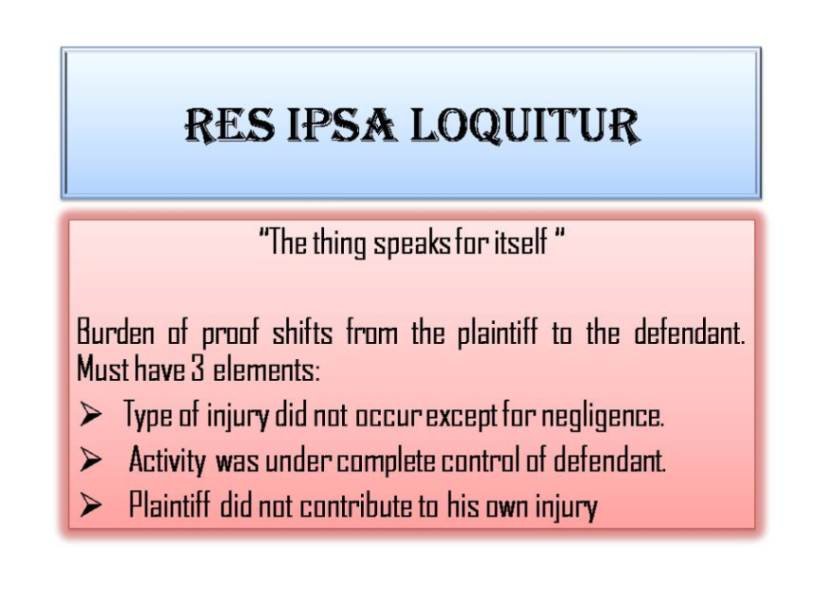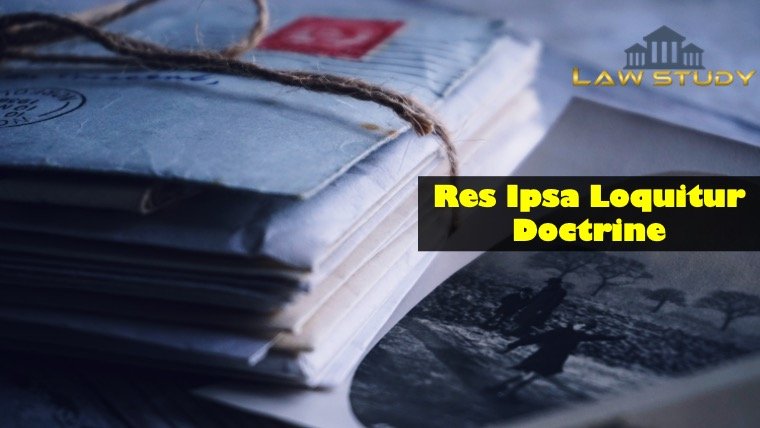Introduction of the Res Ipsa Loquitur Doctrine in Tort Law: – The basic principle is as follows: When Res Ipsa Loquitur is being used, the onus of proof is suddenly shifted from the plaintiff to the defendant.
In most cases, the plaintiff must prove that the defendant was guilty of negligence. The defendant bears the burden of proof. The defendant is generally assumed to be negligent, and he must demonstrate his innocence by proving that his activities didn’t result in the plaintiff’s injury. The defendant is the one who has provided the proof.
Res Ipsa Loquitur Meaning
The Latin term Res Ipsa Loquitur means “things speak for themselves.” At first glance, it appears to be a simple & straightforward maxim to grasp and apply. Furthermore, this isn’t as simple and clear as it appears. “Res Ipsa Loquitur, sed quid in infernos dicetne?” (“It speaks for itself, but what does it say?”) is a famous joke among law school students.

Res Ipsa Loquitur& Evidence Law: Background
Accidents happen, and the mere occurrence of an accident does not always imply that it was caused by someone’s negligence. To prove negligence in a personal injury lawsuit, a plaintiff must present proof that the defendant’s negligence caused the plaintiff’s injury. Even if no definitive proof of the defendant’s negligence, plaintiffs can establish dereliction of duty through circumstantial evidence.
Circumstantial evidence refers to facts that point to gross negligence as a rational conclusion rather than proving it explicitly. This allows judiciary & jury members to infer negligence relying on the circumstances of the case as well as common knowledge derived from human experience. Res Ipsa is a form of circumstantial evidence that makes it possible for a reasonable and appropriate fact-finder to determine that the defendant’s negligence resulted in an unusual situation that caused serious damage to the plaintiff.
This ideology originated from a case in which a plaintiff was injured by a falling flour barrel while walking by a warehouse. The plaintiff’s attorney argued at trial that the facts spoke for themselves and that the warehouse’s negligence was obvious because no other clarification could account for the plaintiff’s harm or injuries.
Res Ipsa, as it has evolved since then, actually allows judiciary and jury members to use common sense to ascertain whether or not a defendant acts negligently.
Burden of Proof in Tort Law
In tort law, establishing someone’s negligence typically places the burden of proof on the plaintiff, the victim of the tort. Proving the defendant’s fault and gathering evidence against their actions or omissions can be a daunting task. If the plaintiff fails to demonstrate negligence on the part of the defendant, the defendant cannot be held liable. Therefore, the principle of “Res Ipsa Loquitur” was introduced, allowing a plaintiff to employ circumstantial evidence to establish negligence.
Lord Wensleydale’s Statement
In the case of Morgan v. Sim (1857) 11 Moo P.C. 307, 312, Lord Wensleydale articulated the burden of proof in cases seeking compensation for damages. He emphasized that the party seeking compensation must establish that the opposing party was at fault. The burden of proof unequivocally rests on the plaintiff, who must demonstrate that the loss resulted from the negligence of the other party. If the plaintiff fails to convincingly establish negligence or default on the part of the defendant, they cannot succeed.
Key Conditions for Res Ipsa Loquitur
Presence of Negligence
For “Res Ipsa Loquitor” to apply, the accident must be of a nature that would not have occurred under ordinary circumstances without negligence.
J.Baron Pollock first proposed the Res Ipsa Loquitur principle in Byrne v. Boadle. A barrel of flour that had fallen from a second-story window struck Byrne. The court assumed that a barrel of flour falling from a second-story window was sufficient proof of negligence.
Control by the Defendant
The object or event causing the damage must have been under the direct control of the defendant or their representative. While not all circumstances need to be under the defendant’s control, the events leading up to the accident should be. If other parties were also in control of these events, the mere occurrence of the accident is insufficient evidence against the defendant.
Freedom from Contributory Negligence
“Res Ipsa Loquitur” applies when the plaintiff or a third party did not contribute to the injuries. If it is determined that the plaintiff or a third party had a role in causing the injury, the principle may not apply.
Res Ipsa Loquitur Elements
Since personal injury and evidence laws are ascertained at the state level, the law concerning res ipsa loquitur differs slightly between states. Nonetheless, an overall consensus has emerged, and most states adhere to a single basic composition of res ipsa.
Before a judge can reasonably conclude that the defendant’s act caused the harm in question, the plaintiff must meet three prerequisites under the res ipsa principle:
- Normally, the event does not occur unless someone has been negligent;
- The evidence excludes the possibility that the plaintiff’s or a third party’s actions caused the harm or injury; and
- The form of negligence at issue is dependent on the defendant’s liability to the plaintiff.
Application in Medical Practice

“Res Ipsa Loquitur” is relevant in medical malpractice cases where foreign objects are left inside a patient’s body after surgery, resulting in harm or death. To invoke “Res Ipsa Loquitur” in such cases, it must be demonstrated that there is a direct object or evidence that establishes negligence.
Examples from Medical Practice
In A.H. Khodwa v. the State of Maharashtra, a mop was inadvertently left inside a patient’s abdomen during surgery, leading to peritonitis and the patient’s death. Negligence was inferred from the object left inside the patient.
In Mrs. Aparna Dutta v. Apollo Hospital Enterprises Ltd., an abdominal pack was unintentionally left in a patient’s abdomen after a uterine removal surgery, resulting in harm. “Res Ipsa Loquitur” applied due to the direct evidence of negligence.
Application in Road Accidents
The doctrine of “Res Ipsa Loquitur” is also relevant in road accidents where multiple instances of negligence by drivers or passengers contribute to the accident. This principle applies when the only reasonable inference from the facts is that the accident could not have occurred without the defendant’s negligence.
Conditions for “Res Ipsa Loquitur” in Road Accidents
The type of accident must typically result from negligence, and the defendant’s actions could have prevented it.
The defendant must have had sole control over the conditions leading to the accident.
Examples of Road Accidents
In Karnataka State Road Transport Corporation v. Krishnan, two buses collided in a manner that resulted in severe injuries to passengers. The accident itself indicated negligence on the part of the drivers, and “Res Ipsa Loquitur” applied.
In Gangaram v. Kamlabai, a taxi’s front tire burst, leading to a rollover accident. The speed of the taxi and the circumstances of the accident pointed to negligence. “Res Ipsa Loquitur” was employed, and the defendants were held liable.
Instances Where “Res Ipsa Loquitur” Does Not Apply
The maxim does not apply when different inferences are possible from the facts, or when the cause of negligence is unknown. In cases where the circumstances do not indicate the defendant’s negligence, “Res Ipsa Loquitur” may not be invoked.
Analysis Of Case Laws
Roe v. Minister of Health
In this case, the plaintiff was hospitalized for minor surgical procedures. The plaintiff developed spastic paraplegia after receiving spinal anesthetics via nupercaine injections. The anesthetics were kept in glass ampoules immersed in a phenol solution, and the judge or jury concluded that the injuries were caused by phenol, and could have entered the ampoules through flaws that were not accessible on visual evaluation.
The plaintiff argued that the Res Ipsa Loquitur doctrine should be applied against the hospital because the injury wouldn’t have even happened if the hospital had not been negligent. The court determined that the doctrine could not be applied and that the defendant could not be held liable because the incidence of the injury or damage was not predicted. And the actual cause of the injury was beyond the defendants’ control. It was described as an unidentified tort-feasance case.
Thus, in the particular instance of unintentional offences where the commission of the offence itself was unknown, the defendant can’t be held liable because it is an unknown tortfeasor.
Houghland v. R.R. LOW Ltd.
At the start of the journey, the plaintiff’s suitcase was left with the defendant’s bus driver’s owner. When the bus broke down, the owner’s servants moved the luggage from the bus’s boot to another bus. The suitcase was nowhere to be found at the end of the journey. The plaintiff was entitled to damages, and the court determined that if the suitcase was lost, it was up to the defendant to prove that he was not guilty of negligence, which is nothing more than Res Ipsa Loquitur.
M.C.Mehta v. Union of India
This is a PIL(Public Interest Litigation) involving the institution of enterprises engaged in dangerous works in densely populated areas as a result of the Olium gas leak. The Olium gas leak occurred at Shriram Mills’ workplace. Olium is a dangerous gas, and the essence of the gas has resulted in the deaths of many individuals as well as severe injuries to the health of those who are in close proximity.
It was not feasible to prove the mill owners’ negligence, so Res Ipsa Loquitur was used to shift the burden of proof to the mill owners to demonstrate that they were not guilty of negligence. In the PIL, it was pleaded that if any industry is engaged in situations of injuries/damage caused by the high-risk activities it engages in, the onus should be on them to prove that they were not negligent. In this particular instance, the maxim was applied to determine negligence, and they were found liable for the probably resulting harm & damage or injury.
It was also decided that any industry that engages in occupational hazards will be deemed grossly negligent prima facie, and it’ll be up to them to initiate the evidence as well as demonstrate how they are not guilty of negligence, failing which they’ll be held legally responsible & liable.
The defendant will present evidence in Res Ipsa Loquitur. The establishment of Res Ipsa Loquitur is a two-step process.
- Whether or not the unfortunate incident ended up caused by the gross negligence of someone else.
- Whether the defendant was the sole operator of the modality that resulted in the accident.
If discovered, Res Ipsa Loquitur simply creates an assumption of negligence.
Conclusion
Res Ipsa Loquitur is a legal principle that can be used in a variety of instances. It is mostly used in commercial airplane accidents and road and traffic accidents in The US.
In the modern era, Res Ipsa Loquitur is gaining in popularity. It is used in cases involving industries, such as the use of the phrase in M.C.Mehta v. UOI, also known as the helium gas leak case, and in a broad sense all cases where the public’s rights have been infringed and they have been harmed and they are unable to establish negligence. As a consequence, the onus of proof is moved to the defendants.

























